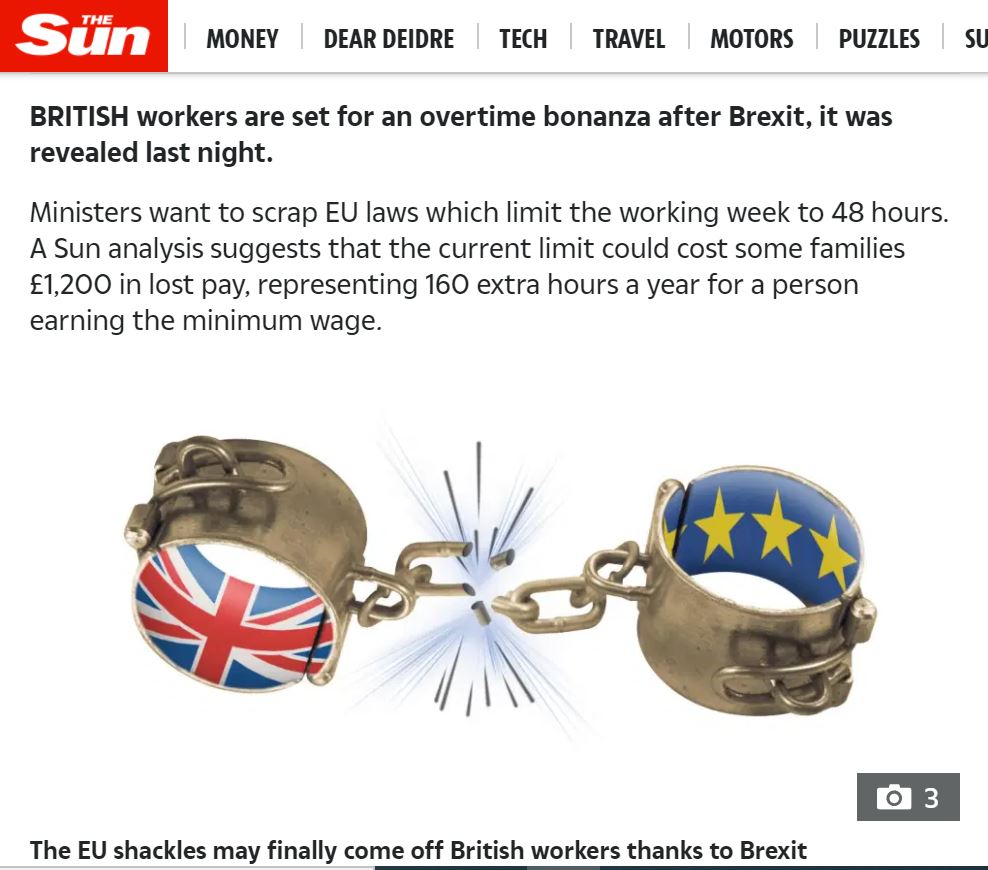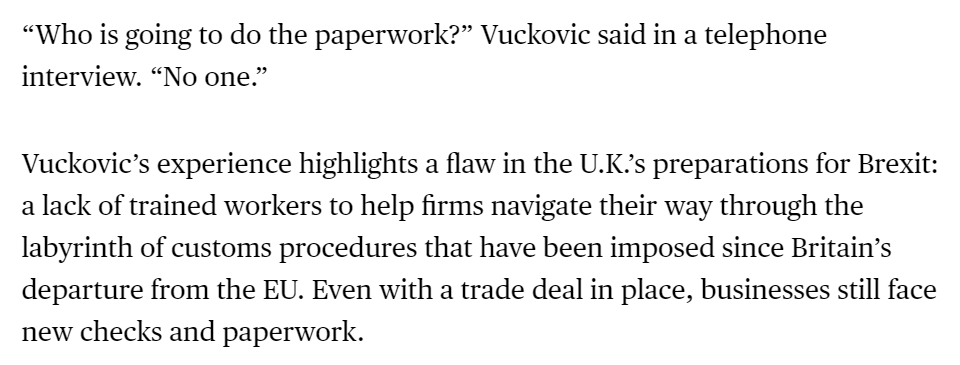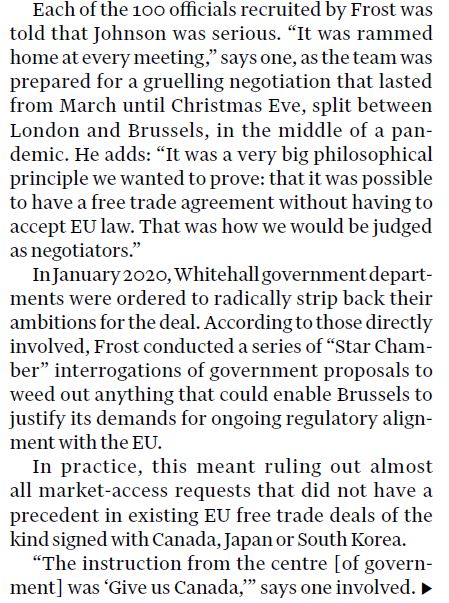Categories Brexit
Important story on what a “tariff-free” deal means in practice and why it’s not enough for two economies as closely integrated.
Tariffs are removed on goods that meet rules of origin. This is a complex and nuanced area of customs.
/1
\U0001f6a8\U0001f6a8\U0001f6a8\U0001f1ea\U0001f1fa\U0001f1ec\U0001f1e7\U0001f69b\U0001f692\U0001f1ea\U0001f1fa\U0001f1ec\U0001f1e7\U0001f6a8\U0001f6a8\U0001f6a8 serious #brexit story alert - companies now starting to see penny drop on what rules of origin does to supply chains (food for example) but Brussels seems deaf to both EU & U.K. pleading. A bellwether? \U0001f62c Stay with me. 1/
— Peter Foster (@pmdfoster) January 6, 2021
https://t.co/HoDSDxhKaL
Important to remember that trade deals (FTAs) weren't designed with such a high degree of economic integration in mind.
So some of the standard RoO provisions will seem incredibly restrictive under the UK-EU deal.
/2
Minimal operations or insufficient processing is a standard part of an FTA. Most, if not all FTAs, include a provision on minimal processing – processing not considered sufficient to confer originating status even if rules of origin have been met.
/3
It is standard procedure not to apply cumulation when goods have only been subject to minimal processing.
To be able to cumulate origin and consider the final product of UK origin, the processing carried out in the UK needs to exceed minimal operations.
/4
The level of integration between the UK and the EU means that this will have significant consequences for a number of industries.
For example, in supply chains where goods are brought into the UK from the EU and reassembled, sorted or repackaged and re-exported to ROI.
/5
This is perhaps the most complex 🧵 on #Brexit I've ever attempted. But this issue really matters.
Business, possibly even lives, depend on getting this stuff right.
It is about the complexity of Brexit delay, and what to do about it.
1/25
If negotiations had gone to plan, it would have worked thus:
1️⃣ 🇬🇧&🇪🇺 agree a Deal, politically
2️⃣ That is then turned into a legally ratifiable text
3️⃣ Both sides then ratify - on 🇪🇺 side Member States and the EP, 🇬🇧 side the Houses of Parliament
4️⃣ Deal in force 1.1.2021
2/25
The problem: we do not have 1️⃣ yet.
And with just over 16 days to go - including 🌲 - we do not have time for 2️⃣ and 3️⃣ and hence no 4️⃣.
We *might* have time for 2️⃣ - and that could prove to be significant (see tweet 7 below), but definitely not 3️⃣ on 🇪🇺 side.
3/25
*Essential* problem: by having spent so long talking (I think 🇬🇧 tactic has been to run down the clock - https://t.co/8EJZAJZHqz ) the path to a normal ratification is now ⛔️.
Now ratification becomes harder - legally, politically, practically - with every passing hour.
4/25
The most obvious stumbling block is...
🥁🥁🥁
... the European Parliament!
Parliamentary sovereignty, eh? A topic for another time.
Anyway, the EP has said it will not vote on a Brexit Deal this
Pretty clear again speaking to Mep's they won't countenance debating or ratifying any EU-UK trade agreement before December 31st #Brexit
— Shona Murray (@ShonaMurray_) December 15, 2020
Mep's are pretty annoyed at the very suggestion that it would be provisionally applied and the ratification would be a simple rubber stamp.
As we report today one area being looked at is workers' rights...but it is politically difficult territory.
No cabinet decisions have been taken, but per sources, three potential areas been identified in Business Dept...
- the 48 Hour Week
- holiday pay/overtime calculations
- new EU rules on reporting hours worked...
All potentially possible post #brexit /2
The government says it has no intention of “lowering” workers’ rights....and notes that UK has actually gold-plated many EU regulations...BUT (think of government saying it won't "lower" animal welfare standards)...the devil will all be in the detail, if and when it comes /3
So the government likes to talk about ensuring workers’ rights are protected but ALSO making sure businesses has freedoms and flexibility to grow...so one man's reduction in rights is another freedom to get richer/work harder/be more prosperous. It depends how you sell it. /4
So take this 2017 story from The Sun on the cash bonanza that will be rained down on hardworking families by Brexiteers' (long standing) desire to scrap the 48-hour week. Overtime booooom..../5
https://t.co/QLqQ7rCzkv

Quite an admission by Mandelson https://t.co/yY2Ym0ggby pic.twitter.com/SSVXO9vc43
— Anand Menon (@anandMenon1) December 4, 2020
Let’s put aside for a moment the rights and wrongs of a ‘soft’ Brexit. (Wrong mainly because no one voted for it in the 2016 referendum; it literally wasn’t on the ballot paper.)
There was a fleeting opportunity for a soft Brexit in 2016 *if* the-then PM had chosen to make delivering Brexit a cross-party endeavour. This is what she should have done on an issue of such strategic national importance, and I told her so at the time.
There was a second missed opportunity after the 2017 General Election delivered a hung Parliament. That is as strong a signal as you get in our democracy that it’s time for a cross-party approach. Theresa May chose to buy a confidence-and-supply agreement with the DUP instead.
By mid-2018, the political reality was that Parliament’s choice was between a confirmatory referendum or a Hard (‘No Deal’) Brexit because enough of the Conservative party wanted a ‘clean’ Brexit and the rest either couldn’t agree on an alternative or didn’t care either way.
The likelihood of continued trade problems for a £650 bn trade relationship is why there should be a huge cross-government effort led by the Foreign Office and Department for International Trade to put in place the necessary resources to seek best results.
There isn't.
So the UK's relationship with the EU currently consists of two not particularly good deals and no consistent effort to manage current problems or prevent future ones. Joint committees are a second order problem to putting in place the right internal structures.
But that's been the consistent UK problem in relations with the EU since 2016. Lack of focus on getting the right internal structures, people, asks, strategy, too much attention on being tough and a single leader.
News just in. This doesn't necessarily mean the right structure being put into UK-EU relations. I suspect Frost's main role is to ensure no renegotiations with the EU.
Also, wonder what this says about the PM's trust in Michael Gove?
NEW: David Frost is joining Boris Johnson\u2019s Cabinet! The peer has been appointed a minister at the Cabinet Office, effective March 1.
— Sebastian Payne (@SebastianEPayne) February 17, 2021
Frost will also chair the partnership council overseeing the UK-EU trade deal and oversee reform to "maximise on the opportunities of Brexit"
Disgraceful and shabby if true: not only ideologically blinkered, but ashamed to admit its ideological blinkers and their consequences. https://t.co/7PgOEogTlA
— George Peretz QC (@GeorgePeretzQC) January 9, 2021
The position that we now have now (no relevant provisions under the TCA) is complicated. For EU musicians visiting the UK see
See here a summary of what is permitted from U.K. POV. https://t.co/HkdRlubySr
— Luke Piper (@Pipermigration) January 10, 2021
In essence the UK permits foreign (including EU) nationals to stay up to 30 days to carry out paid engagements, but they must (a) prove they are a professional musician and (b) be invited by an established UK business.
Either condition could be tricky for a young musician starting out and wanting to play gigs. And 30 days isn’t long enough for a part in a show with a run.
Longer stays require a T5 visa - which generally requires you to be in a shortage occupation (play an instrument not played in the UK?) or to have an established international reputation.
The Commission’s view, according to several sources, is that Brexit means existing distribution networks and supply chains are now defunct and will have to be replaced by other systems.
Brexit reality bites: The new dawn of trade friction via @RTENews https://t.co/p6VdlhZUAN
— Tony Connelly (@tconnellyRTE) January 9, 2021
Of course, this was never written on the side of a bus. And never acknowledged by government. Everything was meant to be broadly fine apart from the inevitable teething problems.
It was, however, visible from space to balanced observers. You did not have to be a trade specialist to understand that replacing the Single Market with a third country trade arrangement meant the end of many if not all of the complex arrangements optimised for the former.
In the absence of substantive mitigations, the Brexit winners are those who subscribe to some woolly notion of ‘sovereignty’ and those who did not like freedom of movement. The losers are everyone else.
But, of course, that’s not good enough. For understandable reasons Brexit was sold as a benefit not a cost. The trading benefits of freedom would far outweigh the costs. Divergence would benefit all.
2. Belfast Steve Aitkin/UUP, Mervyn Gibson/OrangeOrder,Jim Allister/TUV, Jamie Bryson/Unionist Blogger, etc etc, all see the Irish Sea Border & different economic arrangements for NI apart from Britain as a “betrayal”. It comes in a long line of Tory”betrayals”.
3. #Belfast They are correct. The Irish Sea Border & EU single market moves N.Ireland closer to the Republic of Ireland in terms of economic https://t.co/tdKZhjKhWu,it doesn’t change the constitutional status of NI but it is a huge psychological blow to a Unionism.
4. #Belfast The DUP utterly failed to “strengthen the Union”. Their attempt to hold the minority Tory Theresa May govt to ransom backfired spectacularly when Boris Johnson won a significant majority. Their arrogance led them to be isolated & resented in Westminster.
5. #Belfast How does Unionism now react to this?Retreat to the”Bunker”?Repeat the ineffective “Flag”street activism of the past? The Union can now only be saved imo by reaching out to the 5-10% swing vote that will decide a future Border Poll on Irish unification,& it is coming.
1) Work permit calculations are based on the points formula from this site - https://t.co/sjqx8Df7Zg
As things stand, while this article deals with England, the system applies to Scotland also.
The goal is 15 points and the article shows various ways to get there. Essentially, play regularly internationally or in a top 5 league and you’re in. But read the article because it’s a bit trickier than that.
2) There are elements of this I’d dispute. For example, here’s the banding of leagues and, lower down, it’s an absolute mess - Denmark (ranked 14 in coefficient table) and Serbia (16) banded lower than Croatia (20), Greece (18) and Czechs (19)? It’s wholly random.

I get the point that leagues should be banded, but there doesn’t seem to have been loads of sense applied to how these things are actually banded, rather they’ve just shoved a bunch of leagues together and hoped for the best.




















